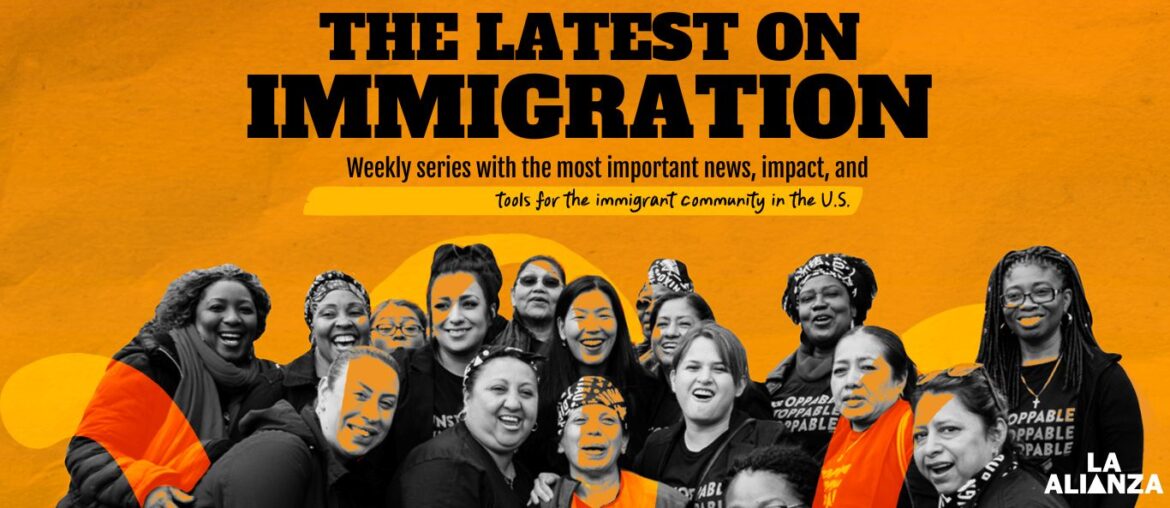This is a summary of the most important immigration news from March 13 to 26, 2025. During this period, the Trump administration has intensified its deportation agenda, redesigned technological tools to encourage “self-deportation,” proposed new travel restrictions, and faced lawsuits over the use of immigration enforcement powers. These actions have raised concerns among immigrant communities, advocates, and civil rights organizations.
Recent News
U.S. relaunches immigration app with “self-deportation” feature: The Department of Homeland Security reconfigured the CBP One app and renamed it “CBP Home.” It now allows undocumented immigrants to voluntarily report their intention to leave the country.
- Why this is important: Although presented as a voluntary alternative, experts warn about the risks of surveillance and use of the information for detentions and possible deportations.
- What you can do: You should not use this app without first consulting a lawyer. There are concerns about its use as a surveillance and intimidation tool. You can access the NDWA attorney directory (NDWA is the partner organization of La Alianza), at the following link: https://www.domesticworkers.org/resources/immigrant-rights/find-legal-help/ There you can find information about where to access legal aid near your home.
- Impact on immigrant communities: Potential criminalization of those who do not comply with “self-deportation,” and expansion of the use of biometric data for immigration control purposes.
ACLU sues Trump over invocation of Alien Enemies Act: The ACLU and Democracy Forward filed a lawsuit against the Trump administration over its intent to invoke the Alien Enemies Act, a 1798 law that gives the president authority to detain and deport citizens of enemy countries in times of war or invasion.
- What we know: According to the lawsuit, the administration would be using this tool for political purposes, circumventing basic legal protections and evading judicial oversight. Civil rights organizations warn that this could lead to mass detentions without due process.
- Why this is important: This is the first time a government has attempted to use the Alien Enemies Act outside of a war context to implement immigration measures. If implemented, it would open the door to expedited deportations without trial of people with foreign citizenship, even if they have legal residency or have lived in the U.S. for years.
- What you can do: Immigrants, especially those from countries that the government may consider “hostile,” should learn about their rights and consult an immigration attorney. It is vital to have up-to-date immigration documentation and to know the legal remedies available for any arbitrary action. The American Civil Liberties Union (ACLU) has a practical guide about immigrant rights, including what to do if you are stopped by Immigration and Customs Enforcement (ICE) officers.
- Impact on immigrant communities: Risk of arbitrary detentions without due process if this law is allowed to be used. As a recent example, 238 Venezuelan immigrants were deported to El Salvador the weekend of March 22-23, despite the fact that a judge had issued a verbal order to suspend those deportations. The administration justified its action using the Alien Enemies Act, arguing that the immigrants represented threats to national security.
Developing Stories and Regional News
These are stories and legislation that are developing or in the pipeline. Details could change.
- USCIS solicits volunteers to support ICE operations: The Trump administration has requested that employees of Citizenship and Immigration Services (USCIS), who are usually in charge of immigration processing, volunteer to support detention and deportation operations conducted by Immigration and Customs Enforcement (ICE). These assignments will initially last for 60 days and may be extended.
- IRS negotiates deal with ICE to share data on undocumented immigrants: The Internal Revenue Service (IRS) is close to finalizing a deal with Immigration and Customs Enforcement (ICE) that would allow the use of confidential tax data to support deportation operations being pushed by the Trump administration. According to reports, the deal would have ICE provide the IRS with a list of people suspected of being in the country without legal immigration status, and then the IRS would cross-reference those names with its internal database. If it finds matches, the IRS would turn over to ICE information such as names, addresses, and other personal data obtained through tax returns filed with Individual Taxpayer Identification Numbers (ITINs).
- U.S. arrests more immigrants in February than in any month in the last 7 years: According to an analysis by The Guardian, ICE detained more than 47,000 people in February 2025. Many of those arrested did not have criminal records.
- Detention of Palestinian student reignites debate on freedom of expression: Mahmoud Khalil, a Palestinian activist and legal permanent resident, was arrested in New York by immigration agents. His case has sparked controversy over the use of the immigration system to punish political activism. The administration has vowed to revoke visas and green cards for those it deems sympathetic to “terrorist organizations.”
- New proposed immigration ban could affect citizens of up to 43 countries: The Trump administration is considering applying new travel restrictions, which could partially or totally suspend the issuance of visas to citizens of countries such as Iran, Cuba, Venezuela, Myanmar and others. This new proposal would be broader than previous immigration bans and could affect families, students, and workers.
Immigration in numbers
- 47,600 immigrants are currently detained by ICE, exceeding the system’s planned capacity (38,500).
- The number of people without a criminal record who were arrested increased by 221% from January to February 2025.
- 30,000 people missed their immigration appointments after the elimination of the CBP One app.
Resources
- For more help, visit the National Domestic Workers Alliance’s “Know Your Rights” hub. It includes immigrants’ rights, immigration options, and a legal aid directory, among other resources. To access the information, visit ndwa.us/immigrant.
Note: The National Domestic Workers Alliance is the partner organization of La Alianza
- To identify reliable information, visit: How to identify fake news about immigration and avoid misinformation.
Legal Disclaimer: This information is provided for educational purposes and does not constitute legal advice. It is recommended that you consult with an immigration attorney to assess your specific situation.
Editor’s note: This article was originally written in Spanish and translated into English by Tilde Language Justice Cooperative


